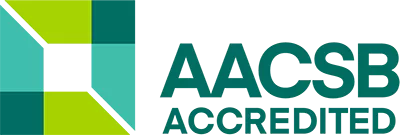

Prepare for the Chartered Financial Analyst (CFA) and/or Certified Financial Planner (CFP) examinations with our AACSB–accredited finance degree. This program features multiple online extracurricular opportunities that allow you to apply your knowledge as you progress through your course work.
Develop essential oral communication skills for efficient collaboration and financial discussions in business situations related to money management, investment strategies, and presenting financial plans.
Think critically by actively considering different points of view, facilitating an integrated, holistic approach to construct relevant analyses and arguments related to organizational and personal financial advising.
Recognize ethical issues and apply ethical theories when making financial decisions at individual and organizational levels.
Analyze and solve financial problems and interpret written and visual material across various business domains to make informed decisions about investment management and addressing financial risk.
The bachelor’s degree in finance courses provide a firm grounding in the principles of business, economics, and accounting — with an in-depth focus on issues and knowledge in finance and financial management.
View Course ListYou will study all components of the field of finance, including investments, corporate finance, and financial markets. You’ll also develop a solid foundation in principles of finance, including capital management, investment and portfolio management, financial institutions, and personal finance.
To change your major to finance, you must earn at least 29.1 credits and a C or better in the following 5 entry-to-major courses:
A Behrend campus dean's review is required for all students in order to enter the major directly as well as for all students who have earned 45 or more transferable credits.
A current Penn State student needs a grade point average of 2.0 or higher to enter the major. Transfer students require a minimum 2.0 cumulative grade point average to enter the major.
The Bachelor of Science in Finance degree requires students to complete a minimum of 120 credits.
The number of credits you will have to take will vary according to the courses you transfer into the degree program. Once you are admitted into the degree program, an assigned academic adviser will help you with remaining requirements; 21 of the 45 General Education credits are included in the requirements for the major.
Introduction to the role of accounting numbers in the process of managing a business and in investor decision-making.
Prerequisite MATH 21 or a higher math course or a satisfactory score on the mathematics placement examination C or better A student enrolled in this course must receive a grade of C or better. ACCTG 426 Financial Statement AnalysisThe exploration of conventional and advanced methods of analyzing financial statements, including the assessment of earnings quality.
Prerequisite C or better A student enrolled in this course must receive a grade of C or better. CAS 100 Effective SpeechIntroduction to speech communication: formal speaking, group discussion, analysis and evaluation of messages.
C or better A student enrolled in this course must receive a grade of C or better. ECON 102 Introductory Microeconomic Analysis and PolicyMethods of economic analysis and their use; price determination; theory of the firm; distribution.
C or better A student enrolled in this course must receive a grade of C or better. ECON 104 Introductory Macroeconomic Analysis and Policy National income measurement; aggregate economic models; money and income; policy problems. ENGL 202D Effective Writing: Business Writing Writing reports and other common forms of business communication. Prerequisite (ENGL 15 or ENGL 30) and fourth-semester standing A student may take only one course for credit from ENGL 202A, 202B, 202C, and 202D. C or better A student enrolled in this course must receive a grade of C or better. FIN 301 Corporation FinanceNature of finance function; risk and return concepts; working capital; dividend policies; mergers; security markets; acquisition and management of corporate capital; analysis of operations; forecasting capital requirements; raising capital; and planning profits. Available to baccalaureate students only.
Prerequisite (ENGL 15 or ENGL 30) and ACCTG 211 and ( ECON 102 or ECON 104) and ( SCM 200 or STAT 200) C or better A student enrolled in this course must receive a grade of C or better. FIN 420 Investment and Portfolio AnalysisInvestment and risk, types of security investments, sources of investment information, the broker, the stock market, portfolio management.
Prerequisite C or better A student enrolled in this course must receive a grade of C or better. FIN 451 Intermediate Financial Management Case studies are used to develop skills in solving a variety of financial management problems. Prerequisite C or better A student enrolled in this course must receive a grade of C or better. FIN 471 International FinanceFinancial decision-making in an international environment. Emphasis on topics relevant to small businesses and entrepreneurs.
Prerequisite C or better A student enrolled in this course must receive a grade of C or better. MGMT 301 Basic Management ConceptsExamination of fundamental principles and processes applicable to the study of management. Not available to students who have taken BA 304.
Prerequisite(ENGL 15 or ENGL 30) and ( ECON 102 or ECON 104) and ( MATH 21 or higher or satisfactory score on the mathematics placement examination)
C or better A student enrolled in this course must receive a grade of C or better. MGMT 471W Strategic Management and Business Policy Study of strategic management and business policy formulation and implementation processes. Prerequisite MGMT 301 , MKTG 301W , FIN 301 , SCM 301 BA 422W can be substituted for this course C or better Students need to earn at least a C grade in each course taken to be eligible for the certificate. MIS 204 Introduction to Management Information SystemsProvides an overview of the role of information systems in business process design; the current technologies used for obtaining, storing, securing, and communicating information in support of operations and decision-making within a business organization; as well as the concepts and principles for developing and using popular spreadsheet and database tools.
C or better A student enrolled in this course must receive a grade of C or better. MKTG 301W Principles of MarketingCovers terminology and important concepts related to marketing in the business environment. Domestic and international environments that impact marketing are included, with particular emphasis on the marketing environment, segmentation, positioning, and targeting. Not available to students who have taken BA 303.
Prerequisite(ENGL 015 or ENGL 030 ) and ( ECON 102 or ECON 104 ) and ( MATH 021 or higher or satisfactory score on the mathematics placement examination.)
C or better A student enrolled in this course must receive a grade of C or better. SCM 301 Supply Chain Management Supply chain management concepts, principles, and methodologies. Prerequisite ACCTG 211 and ECON 102 and ( SCM 200 or STAT 200) C or better A student enrolled in this course must receive a grade of C or better.Impact of management's financing, investing, and operating decisions on GAAP–based financial statements.
Prerequisite ACCTG 211 and FIN 301 C or better A student enrolled in this course must receive a grade of C or better. ACCTG 471 Intermediate Financial Accounting ITheory and practice issues in income concepts and value measurement; GAAP; revenues, costs, assets, liabilities, and equities.
Prerequisite ACCTG 211 or ACCTG 311 C or better A student enrolled in this course must receive a grade of C or better. ACCTG 472 Intermediate Financial Accounting IIOff-balance sheet financing; special issues in cost capitalization, liabilities, and equities; matching; funds flow statements; statement analysis; inflation accounting.
Prerequisite ACCTG 371 or ACCTG 471 C or better A student enrolled in this course must receive a grade of C or better. BA 243 Social, Legal, and Ethical Environment of BusinessExplores the ethical, political, social, legal and regulatory, technological, and demographic diversity environment of business.
A student may not receive credit toward graduation for both BLAW 243 and BA 243 . ECON 304 Intermediate Macroeconomic Analysis Analysis of forces that determine the level of aggregate economic activity. Prerequisite C or better A student enrolled in this course must receive a grade of C or better. ECON 351 Money and BankingMoney, credit, commercial and central banking, financial intermediaries, treasury operations, monetary theory and policy, and foreign exchange. Students who have already taken ECON 451 may not schedule this course.
Prerequisite ECON 102 or ECON 104 C or better A student enrolled in this course must receive a grade of C or better. ENGL 15 Rhetoric and CompositionAn intensive, rhetorically based experience in reading and writing that will prepare you both to understand the communications that surround you and to succeed in your own communication efforts.
Prerequisite ENGL 4 or satisfactory performance on the English placement examination C or better A student enrolled in this course must receive a grade of C or better ENGL 30 Honors Freshman CompositionPrepares students both to understand the communications that surrounds them and to succeed in their own communication efforts. The course focuses specifically on analyzing verbal and visual texts (reading) as well as on producing such texts (writing), always in terms of rhetorical principles. Enriched by more rigorous requirements (longer papers, additional research component where the student is required to cite and engage critical sources and conversations). Participation requirements are also enhanced, making for a richer honors experience.
C or better A student enrolled in this course must receive a grade of C or better. MATH 110 Techniques of Calculus IIntroduces and develops the mathematical skills required for analyzing change, and the underlying mathematical behaviors that model real-life economics and financial applications. Develops student knowledge of calculus techniques, and how to use a calculus framework to develop critical thinking and problem-solving skills.
Prerequisite MATH 022 or MATH 40 or MATH 41 or satisfactory performance on the mathematics placement examination C or better A student enrolled in this course must receive a grade of C or better. MATH 140 Calculus with Analytic Geometry IIntroduces and develops the mathematical skills required for analyzing change and creating mathematical models that replicate real-life phenomena. Develops student knowledge of calculus techniques and how to use the calculus environment to develop critical thinking and problem-solving skills.
PrerequisiteMATH 22 and MATH 26 or MATH 26 and satisfactory performance on the mathematics placement examination or MATH 40 or MATH 41 or satisfactory performance on the mathematics placement examination.
C or better A student enrolled in this course must receive a grade of C or better. STAT 200 Elementary StatisticsDescriptive Statistics, frequency distributions, probability and normal distributions, statistical inference, linear regression, and correlation.
Prerequisite Placement into MATH 21 or higher. C or better A student enrolled in this course must receive a grade of C or better.Select 15 credits from any business major field or any non-business major course, except for all Health and Wellness (GHW) courses, any ENGL course below ENGL 15, and any MATH course below MATH 110. Students are encouraged to work with their adviser to identify the appropriate supporting courses.
Some General Education requirements may be satisfied by courses required for the major. Students should work with an adviser to select courses.
These General Education Requirements are for students who started in summer 2023 or later. Students who started earlier can review the prior version of the general education requirements.
If you're ready to see when your courses will be offered, visit our public LionPATH course search (opens in new window) to start planning ahead.
Close Course List
As a graduate of the finance program, you can be prepared to pursue or advance a career in banking, financial analysis, security analysis, corporate finance, or personal financial planning.
View Career InformationThe following roles are often held by people with this type of degree:
Estimates of employment growth and total employment are provided by the U.S. Bureau of Labor Statistics and are subject to change. While these occupations are often pursued by graduates with this degree, individual outcomes may vary depending on a variety of factors. Penn State World Campus cannot guarantee employment in a given occupation.

From the day you're accepted as a student, you can access resources and tools provided by Penn State World Campus Career Services to further your career. These resources are beneficial whether you're searching for a job or advancing in an established career.
Get the resources you need to make informed decisions about your education. Request information on this program and other programs of interest by completing this form.
Learn about this program's tuition, fees, scholarship opportunities, grants, payment options, and military benefits.
Tuition, Fees, and AidUndergraduate tuition is calculated based on the number of credits for which you register and the number of total credits you have accrued at or transferred to Penn State. Tuition is due shortly after each semester begins and rates are assessed every semester of enrollment.
| How many credits do you plan to take per semester? | If you have 59 or fewer credits | If you have 60 or more credits |
|---|---|---|
| 11 or fewer | $632 per credit | $678 per credit |
| 12–19 | $7,678 per semester | $8,288 per semester |
Undergraduate students taking more than 19 credits will be charged the flat tuition rate plus the regular per credit hour rate for each credit above 19.
Some students may qualify for financial aid. Take the time to research financial aid, scholarships, and payment options as you prepare to apply. Military service members, veterans, and their spouses or dependents should explore these potential military education benefits and financial aid opportunities, as well. To view the detailed list of cost of attendance elements, select “World Campus” as the location on the tuition site.
Close Tuition, Fees, and AidIf you currently work in finance or are looking to start a new career, the B.S. in Finance can open doors for your future.


This program is offered in partnership with the Penn State Behrend Black School of Business, which is AACSB accredited, an honor reserved for the top 5% of business schools worldwide.
As a student in this program, you will have the opportunity to participate in extracurricular activities that can further enhance your knowledge and demonstrate to employers that you are motivated to acquire experience in the finance field while pursuing your education.
ExtracurricularsYour in-depth course of study will help prepare you for the Chartered Financial Analyst (CFA) and/or Certificated Financial Planning (CFP) designations.
Additional AffiliationsThe bachelor's in finance has also been accepted into the CFA® Institute University Affiliation Program, a unique accomplishment for an online program. This status is granted to institutions whose program incorporates a significant portion of the CFA Program Candidate Body of Knowledge (CBOK) into its curriculum. Students who complete the required course work will be better prepared to sit for the CFA exams.
This program also recognizes essential topics from the Certificate in ESG Investing from CFA Institute. This professional certificate offers both practical application and technical knowledge in the field of ESG investing.
CFA is a registered trademark owned by CFA Institute.
Close Additional Affiliations
Whether you are looking to finish your program as quickly as possible or balance your studies with your busy life, Penn State World Campus can help you achieve your education goals. Many students take one or two courses per semester.
How Quickly Can I Earn This Degree?Our online courses typically follow a 12- to 15-week semester cycle, and there are three semesters per year (spring, summer, and fall). If you plan to take a heavy course load, you should expect your course work to be your primary focus and discuss your schedule with your academic adviser.
Timelines may vary for students transferring credits from another school or based on course availability.
Close Set Your Own PaceThis program's convenient online format gives you the flexibility you need to study around your busy schedule. You can skip the lengthy commute without sacrificing the quality of your education and prepare yourself for more rewarding career opportunities without leaving your home.


Penn State has a history of more than 100 years of distance education, and World Campus has been a leader in online learning for more than two decades. Our online learning environment offers the same quality education that our students experience on campus.

Apply by October 31 to start January 13
Application InstructionsComplete your application and submit all required materials by the appropriate deadline. Your deadline will depend on the semester you plan to start your courses.
New students are encouraged to complete the FAFSA by March 1. Please visit the Office of Student Aid website for more information about applying for financial aid and recommended deadlines.
This degree program includes Entrance-to-Major requirements (ETMs). After you are admitted to Penn State, you’ll complete them during your first few semesters to officially become a Bachelor of Science in Finance major. If you satisfy these requirements with transfer credits, you’ll be admitted directly into the major.
You will need the following items to complete your application: High school transcripts or GED transcript — First-year applicants are required to submit Self-Reported Academic Records (SRAR) when applying. Official high school transcripts for first-year applicants will only be required at the time a student accepts an offer of admission to Penn State. Transfer international students will need to submit their high school transcript before their application can be reviewed. Official college or university transcripts and/or official military transcripts (if applicable) — All college or university transcripts are required regardless of the length of time that has passed, the grades earned, or the accreditation of the institutions attended. Acceptance of transfer credit toward your degree is subject to final approval by the academic department. For detailed information, see the Transfer Students page. Transcripts not in English must be accompanied by a certified translation. English Proficiency — The language of instruction at Penn State is English. With some exceptions, international applicants must take and submit scores for the Test of English as a Foreign Language (TOEFL) or International English Language Testing System (IELTS). Minimum test scores and exceptions are found in the English Language Proficiency section on the Undergraduate Admissions International Requirements page. Visit the TOEFL website for testing information. Penn State's institutional code is 2660.
To begin the online application, you will need a Penn State account. Create a New Penn State Account If you have any problems during this process, contact an admissions counselor at [email protected] . Please note: Former Penn State students may not need to complete the admissions application or create a new Penn State account. Please visit our Returning Students page for instructions.
Review your information, digitally sign your application, and provide payment for the application fee ($65 domestic or $75 international).
All official documents should be sent to:
Undergraduate Admissions Office
The Pennsylvania State University
201 Shields Building
University Park, PA 16802
You can also have your transcripts sent electronically through Parchment, eScript-Safe, or the National Clearinghouse directly to Penn State from the college/university where course work was attempted.
After receiving your application, application fee, and all required materials, your application will be evaluated for admission. You can check your application status online. This will provide the most up‐to‐date information about the status of your application and is updated once daily, before 8:00 a.m. (ET). Once a decision has been made regarding your application, it will be available to you through the MyPennState portal.
For information on when you can expect an admissions decision, visit the Dates and Deadlines page of the Undergraduate Admissions website. Make sure you click the "+" sign to see these dates for World Campus Applicants (First-Year and Transfer).